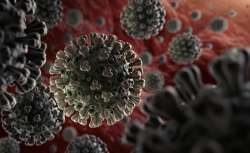Coronavirus is weakening like SARS, suggests new mutation: Study
A study at USA's Arizona State University (ASU) has discovered new mutations of COVID-19 that suggest that the virus is likely weakening like the 2003 Severe Acute Respiratory Syndrome (SARS). In the recent ASU study, a new technology known as next-generation sequencing was used to come to this conclusion.

A study at USA's Arizona State University (ASU) has discovered new mutations of COVID-19 that suggest that the virus is likely weakening like the 2003 Severe Acute Respiratory Syndrome (SARS). In the recent ASU study, a new technology known as next-generation sequencing was used to come to this conclusion.
A press release issued by ASU explains the process that was carried out at the university. "Each sequence is deposited into a worldwide gene bank, run by a nonprofit scientific organization called GISAID. To date, over 16,000 SARS-CoV-2 sequences have been deposited in GISAID’s EpiCoVTM Database. The sequence data shows that SARS-CoV-2 originated from a single source from Wuhan, China, while many of the first Arizona cases analyzed showed travel from Europe as the most likely source," ASU said.
“One of the reasons why this mutation is of interest is because it mirrors a large deletion that arose in the 2003 SARS outbreak," Efrem Lim, an ASU researcher and the lead study author, said in a statement accompanying the release.
During the later stages of the SARS epidemic, the virus underwent mutations that weakened it.
However, study co-author Matthew Scotch told the New York Post that it is too soon to definitely state that the COVID-19 coronavirus is weakening.
Coronavirus has infected close to 4 million people across the globe while killing over 265,000. The world has resorted to strict lockdown as a measure to combat the virus.
